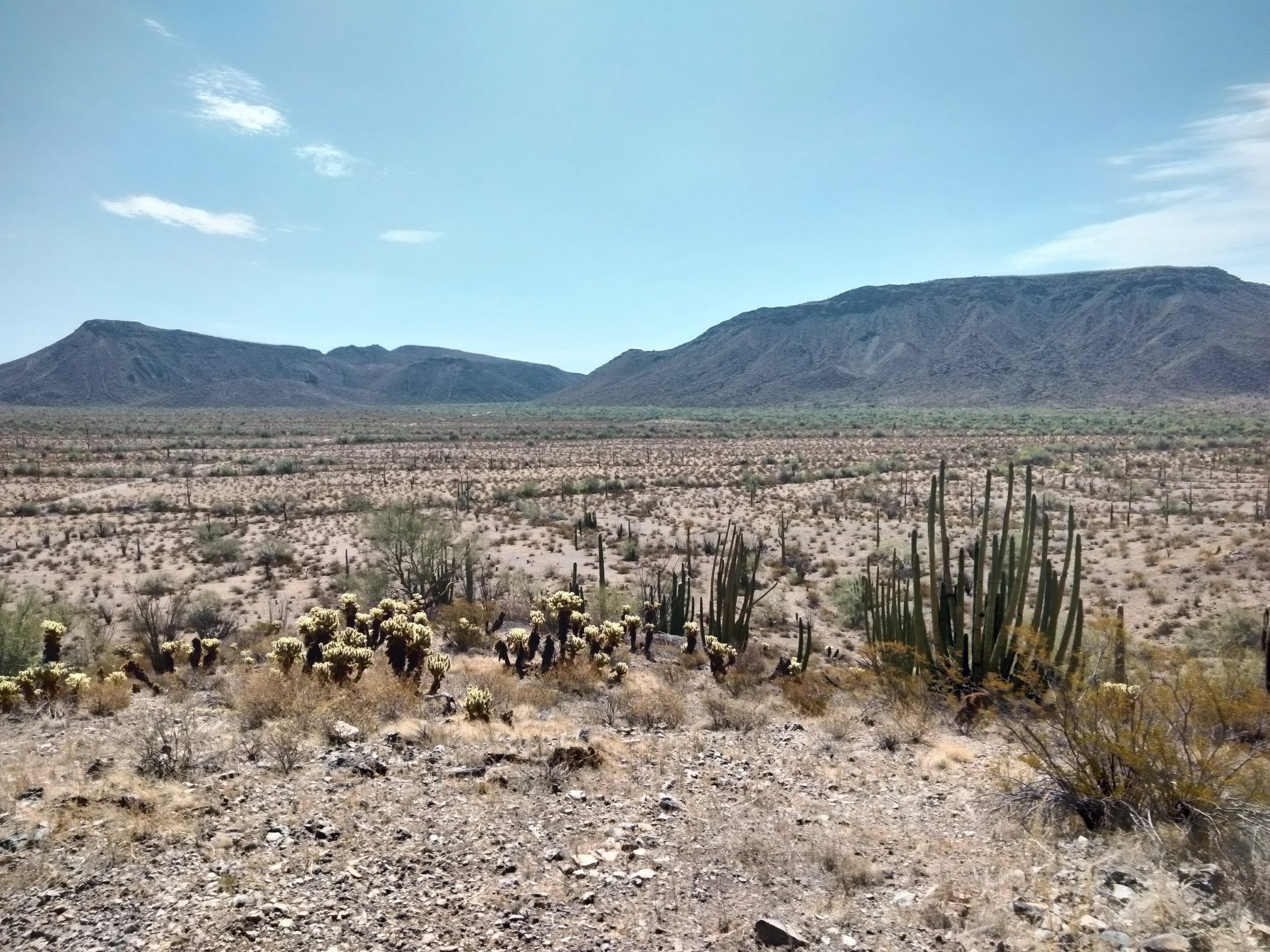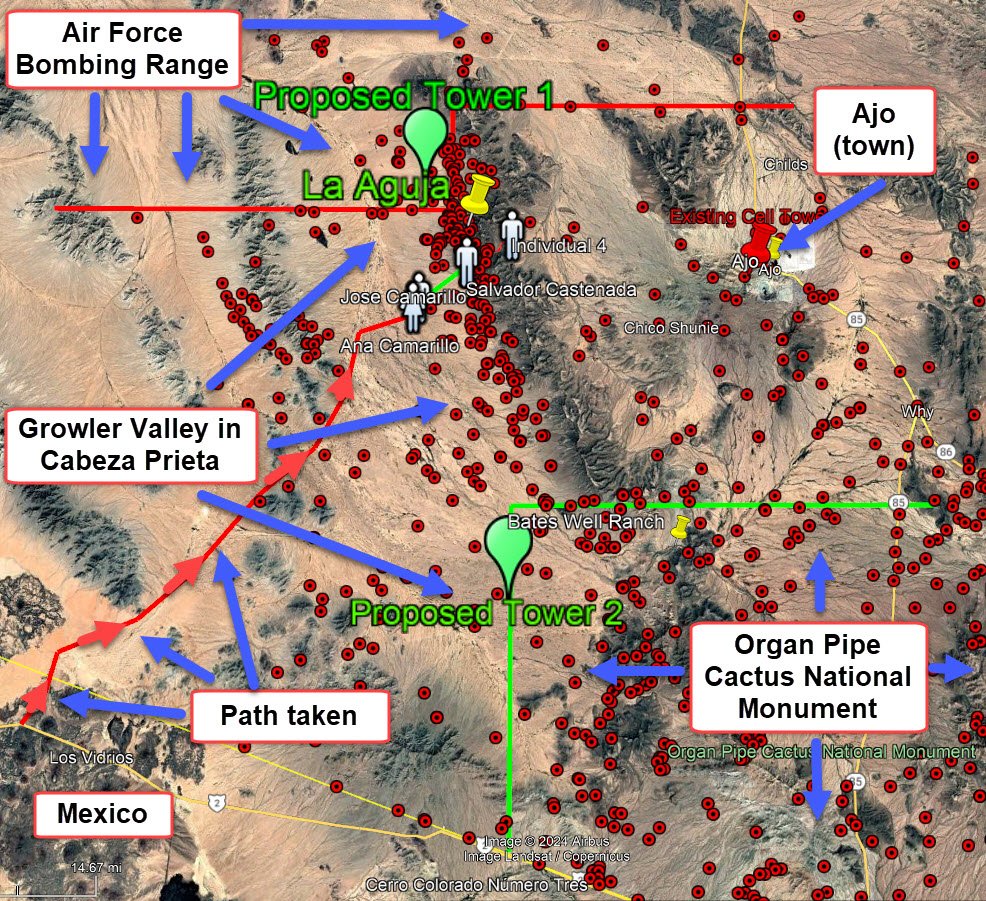
Case Study: A Tragic Loss in the Growler Valley
On June 24, 2024, a group of four migrants—Jose, Ana, Salvador, and an unnamed fourth individual— embarked on a perilous journey through the Growler Valley in Cabeza Prieta. Their story is a heartbreaking reminder of the deadly challenges faced in this unforgiving desert and the urgency of our mission to prevent future tragedies.
By June 25, their water supply was exhausted, leaving them vulnerable to the desert’s relentless conditions. Despite their efforts to support one another, Jose, Ana, and Salvador succumbed to the extreme heat and dehydration on June 26 and 27. They passed within two miles of a location where another individual had encountered life-threatening conditions just a week prior.
The fourth member of the group managed to reach a “tap-out” station—a lifeline for those in desperate need. However, the damage from prolonged dehydration and heat exposure was too severe. After being hospitalized for kidney failure, this individual tragically passed away a month later.
Jose, Ana, Salvador, and their companion were not criminals. They were individuals pursuing safety and opportunity, each with their own stories and dreams. Their lives were unjustly cut short by the harsh realities of the desert.
Remembering Their Sacrifice
Ana Reyes Camarillo
At just 16 years old, Ana was searching for work in the United States, dreaming of opportunities to support herself and her loved ones. Alongside her older brother Jose and two others, she embarked on the grueling trek through the Growler Valley in late June 2024.
Despite her determination, by the 29th mile in 110° degree heat, Ana's strength began to falter. By June 25, the group had run out of water, and Ana fell behind as the harsh conditions took their toll.
On June 26, as her brother Jose went ahead to seek help, Ana stayed behind alone, her body weakened by dehydration and heat exhaustion. She carried a cell phone, but there was no coverage in the remote expanse of the desert. At 3:00 PM that day, Ana passed away, just two miles from potential assistance.
Ana was only 16, with her whole life ahead of her. She was not just another statistic; she was a young girl with dreams and ambitions, seeking hope and opportunity in a foreign land. Ana Reyes Camarillo's story stands as a tragic testament to the dangers faced by those seeking a better life.
Jose Reyes Camarillo
As a young 18-year-old, Jose Reyes Camarillo displayed courage and loyalty beyond his years. Together with his sister Ana and two companions, Jose set out for the United States in search of work and opportunities to support his family by venturing into the harsh terrain of the Growler Valley.
As the group ran out of water on June 25, Jose stayed by Ana’s side, unwilling to leave her alone in her weakened state. Despite his own exhaustion, he showed the kind of devotion that speaks to the depth of their bond.
On the morning of June 26, knowing that time was running out, Jose made the difficult decision to leave Ana and try to reach a nearby tap-out station. Weak and dehydrated, he walked just half a mile further before surrendering to the brutal desert conditions. He passed away at 11:30 AM, far from the help he sought.
Jose was not a criminal; he was a young man with dreams, responsibilities, and a determination to care for those he loved. His sacrifice for his sister and his courage in the face of impossible odds are a poignant reminder of his character and his humanity.
Salvador Castenada
Salvador Castenada's story is one of selflessness and sacrifice. At 42 years old, Salvador left behind a wife and child, driven by the hope of finding work in Canada. His journey, however, was tragically cut short in the desolate expanse of the Growler Valley, where he stayed behind to help others survive.
When the group found themselves stranded without water and in desperate need of help, Salvador made the brave decision to stay behind with Ana and Jose Reyes Camarillo, who were both struggling with the brutal desert conditions. While his companions pressed forward in search of rescue, Salvador remained by their side, trying to keep them alive in the face of overwhelming odds.
On June 27, Salvador passed away at 8 AM, just one mile from the tap-out station that could have saved him. Despite having a phone on him, there was no cell coverage in the area, leaving him without the ability to call for help in his final moments.
Salvador was not just a migrant worker; he was a father, a husband, and a compassionate human being who risked everything to help others in need. His selflessness in the face of danger, his love for his family, and his unwavering commitment to help Ana and Jose are a testament to the strength of the human spirit.
The Path Taken
A Case Study
This is just one case of the hundreds that have taken place since the year 2000. There are an average of 29 deaths per year in the Cabeza Prieta desert, with 303 recorded deaths since the year 2000. We are sure after talking with the Search and Rescue Groups that there are many more bodies that were not recovered.
A lack of cell coverage is by far the most impactful when it comes to desert travelers and law enforcement in need of help. As shown on the map, the range of the current cell towers near the town of Ajo and Childs Mountain is shadowed/cut off by the Growler Mountains. This is why many of the cell phones of the victims show repeated use of 911, but to no avail.
As depicted in the first map, the initial walk from Mexico to Ana’s final resting place was an arduous 29 miles. By the time the group reached her location, they were all suffering from dehydration and exhaustion, their bodies already showing the toll of the unforgiving environment.
From Ana’s location, the group was forced to continue with the hope of reaching safety. Jose, determined to save his sister and the others, ventured ahead. After walking just half a mile, his strength gave out where he then passed away. 3 miles later, Salvador passed away just out of reach from safety at a nearby tap-out station with no signal to call for help. The fourth individual, who had made it further than the others, managed to reach the tap-out station and contact Border Patrol.
A Call to Action
This case underscores the importance of CPR (Cabeza Prieta Rescue) using Cell Towers. It reminds us that every person deserves dignity and a chance to survive, regardless of their circumstances.
In the coming months we will present a documentary called “Death in the Growler Valley.”
Those who wish to help should contact John or Laura Hunter.






